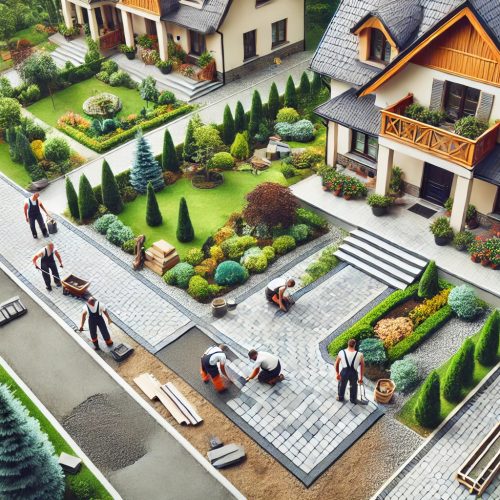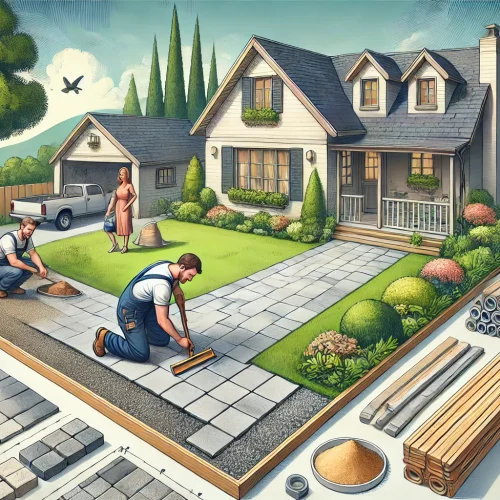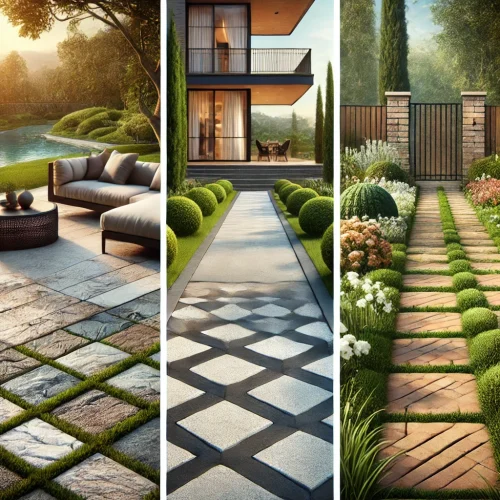Paving is much more than a functional solution for outdoor and indoor surfaces. It defines the style, durability, and even the value of your property. Choosing the ideal paving material for your space requires considering not just aesthetics but also factors like resilience, maintenance, and cost-effectiveness. This article provides a detailed analysis of the main paving materials available on the market and their features, helping you make the perfect choice.
Why Choosing the Right Paving Material Matters
Selecting the right paving material isn’t just about looks; it’s a decision that affects the functionality, longevity, and maintenance cost of the space. The ideal paving material combines style and practicality, transforming outdoor areas like patios, walkways, and driveways into inviting and durable spaces.
Additionally, high-quality materials help prevent issues such as soil erosion, uneven surfaces, and water pooling. Depending on your choice, paving can meet specific needs like heavy traffic, weather exposure, or decorative use.
Key Paving Materials and Their Features
Concrete Pavers
Concrete pavers are a popular choice for outdoor paving due to their versatility and durability.
- Advantages:
- High resistance to weight and wear.
- Available in various colors, textures, and shapes, allowing custom patterns.
- Easy to replace individually if damaged.
- Cost-effective.
- Disadvantages:
- Requires maintenance to prevent dirt buildup.
- May fade over time, depending on quality.
Concrete pavers are ideal for sidewalks, driveways, and patios. Their durability and affordability make them an efficient option for balancing functionality and economy.
Natural Stone
Natural stones such as granite, slate, and limestone offer a sophisticated and timeless touch to spaces.
- Advantages:
- Luxurious and unique appearance with natural color and texture variations.
- Highly resistant to harsh weather conditions.
- Long lifespan with minimal replacement needs.
- Disadvantages:
- High initial cost and requires skilled labor for installation.
- Can be slippery when wet, depending on the finish.
Natural stones are perfect for outdoor spaces like patios and gardens, as well as decorative indoor applications.
Clay Bricks
Clay bricks are a classic option that offers an unmatched rustic charm.
- Advantages:
- Sustainable, made from natural materials.
- Durable and resistant to extreme weather conditions.
- Age gracefully, developing a natural patina over time.
- Disadvantages:
- Requires maintenance to prevent moss or stains.
- More time-consuming to install and relatively costly.
Clay bricks are ideal for pathways, patios, and garden walkways, creating cozy and timeless environments.
Asphalt
Asphalt is widely used for driveways and access roads due to its durability and cost-effectiveness.
- Advantages:
- Smooth surface, ideal for vehicle traffic.
- Lower cost compared to other durable materials.
- Easy to repair and maintain.
- Disadvantages:
- Less attractive aesthetically.
- Shorter lifespan in extremely hot climates, where it may crack.
While not the most decorative option, asphalt is practical and efficient for areas demanding strength and functionality.

Permeable Paving
Permeable paving is designed to allow water infiltration, helping reduce surface runoff and preventing floods.
- Advantages:
- Sustainable and eco-friendly, promoting groundwater recharge.
- Reduces drainage issues in urban areas.
- Offers modern aesthetics and functionality.
- Disadvantages:
- Higher initial cost.
- Requires maintenance to prevent clogging of permeable spaces.
Ideal for driveways, parking lots, and public spaces, permeable paving blends functionality with environmental responsibility.
Treated Wood
Though less common for paving, treated wood is an interesting option for decks and outdoor leisure areas.
- Advantages:
- Natural and cozy appearance.
- Easy to install and adaptable to different shapes.
- Cost-effective for leisure spaces.
- Disadvantages:
- Requires regular maintenance to prevent rot and insect damage.
- Shorter lifespan compared to other materials.
Treated wood is ideal for spaces like poolside decks or entertainment areas.
Factors to Consider When Choosing Paving Materials
When selecting the ideal material for your project, it’s essential to evaluate:
- Budget: Ensure the material fits within the total project cost, including installation and maintenance.
- Local Climate: Choose materials that can withstand the weather conditions in your region.
- Personal Style: Consider the design and look you want for the space.
- Space Usage: Determine whether the area will be used for heavy traffic, leisure, or decorative purposes.
Conclusion
Transforming your space with the right paving is an investment that goes beyond aesthetics. Materials like concrete pavers, natural stones, and permeable paving offer solutions that combine beauty, functionality, and durability. When planning your project, consider the factors outlined above to ensure the final result meets your expectations and needs.
With the right choices, you can transform any area into a sophisticated, practical, and valuable space, whether for personal enjoyment or to enhance property value.









